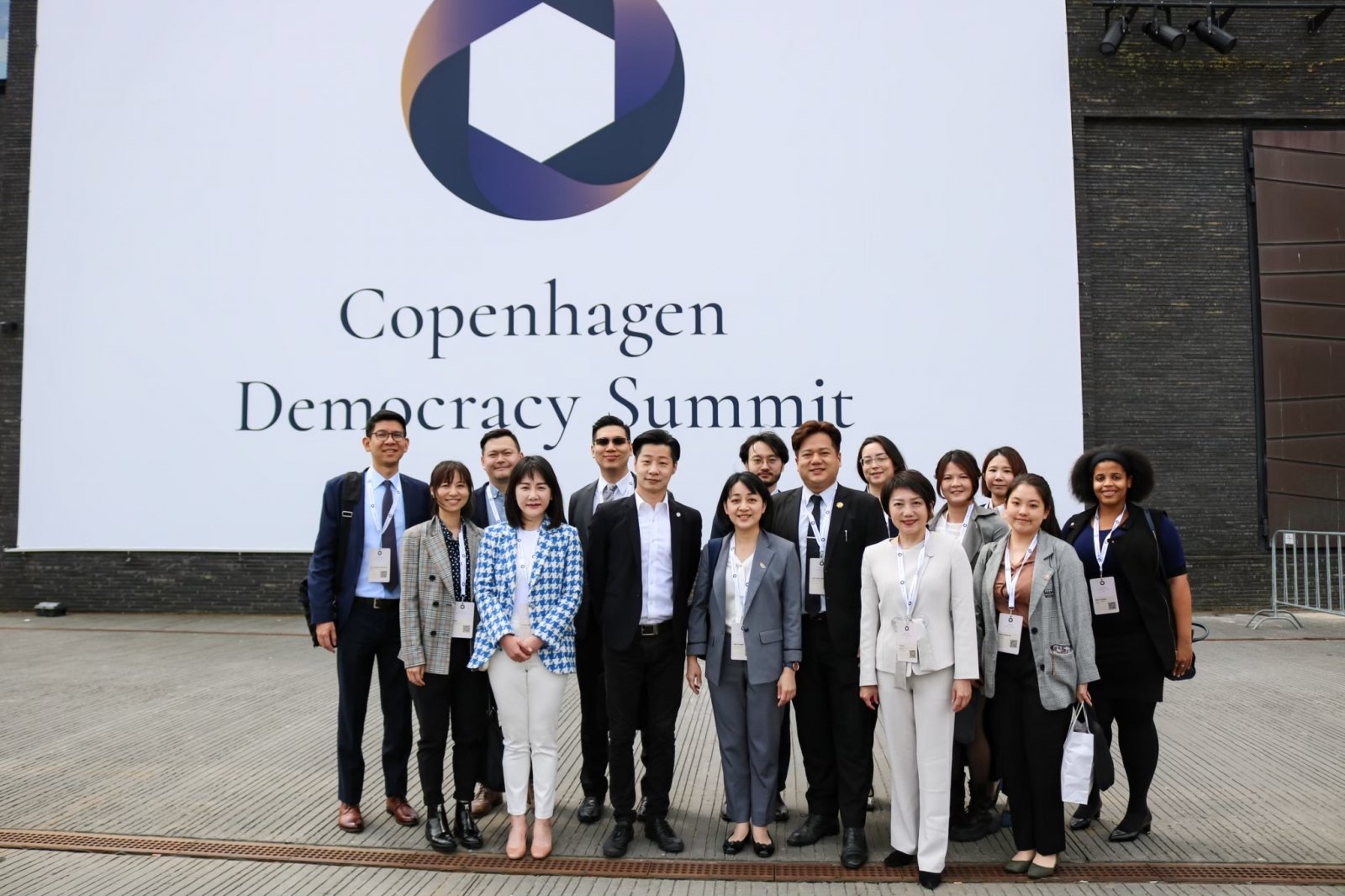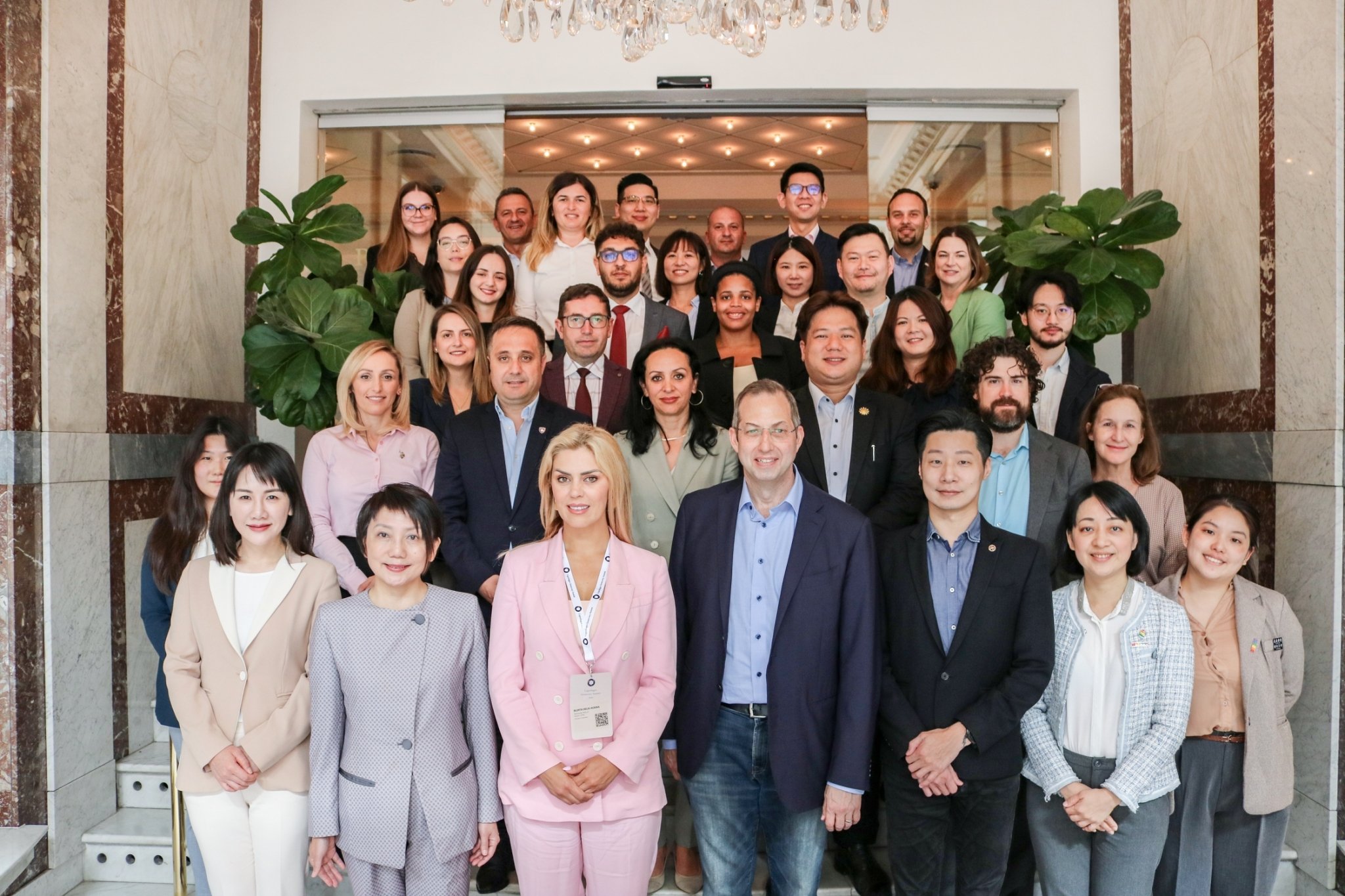
SHARE
A growing number of authoritarian powers have weaponized corruption and information operations to influence elections, policymaking and civic discourse in other countries to benefit their political or geostrategic objectives. From Moldova to Myanmar, interference and disinformation in elections and national politics have become the rule rather than the exception.
Against this backdrop, pro-democracy stakeholders around the world came together in June at the Copenhagen Democracy Summit to work towards the common vision of bolstering democratic resilience against authoritarian powers. On the sidelines of the Summit, NDI hosted an international knowledge exchange for members of parliament (MPs), legislative staff and civil society representatives from the Republic of Kosovo and Taiwan. Though separated by geography and language, Taiwan and Kosovo face common challenges: both countries are subjected to foreign-sponsored influence campaigns and find themselves on the frontlines of the struggle between democracy and autocracy.
Kosovo-Taiwan Knowledge Exchange in Copenhagen .jpg

Through bilateral dialogue and exchanges with politicians and activists from Sweden, Latvia, Estonia and Denmark, participants identified a number of salient lessons for building resilience to foreign-sponsored corruption and influence operations:
-
Transparency is a critical countermeasure to covert foreign influences when effectively designed and consistently implemented. Absent transparency, key democratic stakeholders – including governments, election commissions, legislatures, political parties, the media, civil society and the public – are unable to detect, track or act to stem these patterns of influence.
-
Legislatures play a fundamental role in strengthening democratic resilience through enhancing transparency, participation, and oversight, thereby increasing public trust in the political system. Estonia’s impressive digital society provides an example of transparency and public trust by boasting user-friendly and accessible digital services. 99 percent of all government public services are online 24 hours a day, and 82 percent of all users said they trusted the public e-services provided by the government. Such initiatives have enabled Estonia to reach “an unprecedented level of transparency in governance” through its safe, convenient, and flexible digital ecosystem – contributing to a high degree of trust in its governmental institutions and digital society.
-
There is no single solution or universal democratic model to combat illiberal influences; it requires developing and experimenting with innovative strategies tailored to a country’s context, such as Taiwan’s “humor over rumor” approach, employed to counter disinformation efforts throughout 2020 surrounding the COVID-19 pandemic.
-
Promoting resilience to authoritarianism requires a whole-of-society and inter-generational approach. For example, the Assembly of Kosovo (Assembly) hosts town halls to make the Assembly more accessible to the public through open debates with citizens and fostering civic education among students.
-
The role of parliamentary monitoring organizations is essential to ensure transparency and oversight within political processes. In 2015, the Kosova Democratic Institute (KDI) launched an interactive online platform to monitor the Assembly’s work. Users can explore profiles of MPs, legislative agendas, and plenary sessions and then ask questions. Meanwhile, in Taiwan, Citizen Congress Watch (CCW) tasks itself with bridging the information gap between the public and the Legislative Yuan by providing public evaluations of legislators created by teams of scholars, topical experts and public representatives.
-
Parliamentarians from Latvia emphasized the right to information as critical to openness and cooperation with the public in legislative processes. In Latvia, committee agendas and meetings are recorded for the public, including decision-making documents by the Saemia, Latvia’s parliamentary body. Latvia’s efforts to regulate lobbying is another practice to increase clarity in decision-making as well as adapting a Code of Ethics for MPs to build institutional integrity. Additionally, Kosovo’s Forum for Parliamentary Transparency (the Forum) launched the Legislative Tracking System – an online tool that enables civil society organizations to track the progress of legislation through the legislative process.
-
Governments and legislatures can take proactive steps to practice parliamentary openness regardless of Open Government Partnership (OGP) member status. Although Kosovo and Taiwan are not formal members of OGP, they have become leaders in their respective regions by elevating the integrity of government structures and operations. Working with representatives from parliament and civil society, Taiwan’s Open Parliament Multi-Stakeholder Forum (OP-MSF) and Kosovo’s Forum for Parliamentary Transparency have each created Open Parliament Action Plans (OPAP) to enhance open government and transparency mechanisms amid foreign illiberal threats. OGP’s public information on best practices and examples of parliamentary openness from its 77 member countries also serves as guiding resources. Currently, Taiwan is in the process of developing an Independent Reporting Mechanism (IRM) to evaluate its OPAP based on OGP’s public resources and Kosovo’s Forum is developing its second OPAP.
-
Gender parity in legislatures and expanding avenues for diverse political participation is paramount to building an inclusive and resilient democracy. In 2005, Taiwan amended its constitution to require that at least half of party-list MPs be women. In January 2020, 41.59 percent of MPs in Taiwan’s Legislative Yuan were women (the highest percentage of female lawmakers in Asia) compared to 20.89 percent in 2004.
-
Co-creation, collaboration and community are foundational to sustained efforts toward democratic development. To this end, NDI’s knowledge exchange in Copenhagen united MPs, legislative staff and civil society representatives in one room, opening opportunities to build trust and actively engage with not only domestic, but international allies in the process.
Among the participants, there was consensus that democratic development is a process, rather than a destination. In NDI’s knowledge exchange, Jesper Olsen, Chairman of Transparency International Denmark, stated that, “A perfect democracy is one that you know is not perfect.” This sentiment reflects the motivation of the Taiwanese and Kosovar participants to examine and exchange on the challenges their countries face, recognizing that an inclusive, open and clear-eyed assessment is the best way to strengthen and defend their democracies.
NDI's engagement on democratic governance is implemented with support from the National Endowment for Democracy.
Author: DoYun Kim, a Program Officer with the Democratic Governance Team
###
NDI is a non-profit, non-partisan, non-governmental organization that works in partnership around the world to strengthen and safeguard democratic institutions, processes, norms and values to secure a better quality of life for all. NDI envisions a world where democracy and freedom prevail, with dignity for all.


